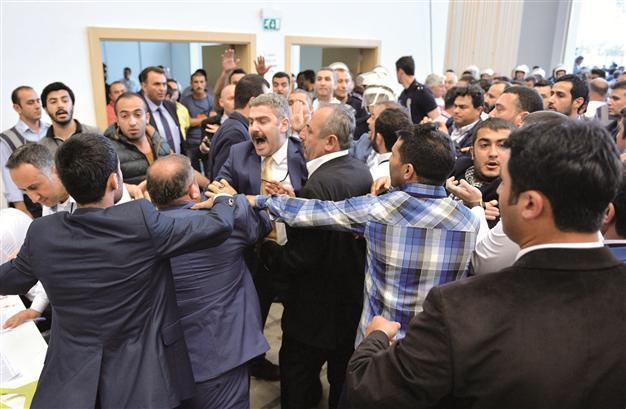Election fair, threshold not: OSCE/PACE observers
Sevil Erkuş - ANKARA

CİHAN Photo
Fundamental freedoms were generally respected and voters could choose from a wide range of political parties in Turkey’s June 7 elections, but the 10 percent threshold to enter parliament limits political pluralism, international observers said June 8.President Recep Tayyip Erdoğan breached constitutional impartiality during the electoral campaign and increased pressure on opposition figures, stated the international observation mission, which included the OSCE Office for Democratic Institutions and Human Rights (OSCE/ODIHR), the OSCE Parliamentary Assembly (OSCE PA), and the Parliamentary Assembly of the Council of Europe (PACE).
“We praise the active participation of citizens, the high voter turnout and the broad observation activities by parties, as well as by citizen observer groups, which in the future should be granted legal status,” said Tiny Kox, head of the PACE Delegation at a press conference on June 8.
The president played an active role in the election campaign, even though the constitution obliges him to be non-partisan, participating in an extraordinary number of public events, which were used as opportunities to campaign in favor of the ruling party and to criticize opposition figures, Kox said.
Several Supreme Election Board (YSK) decisions were inconsistent with legislation, including in relation to campaigning and election administration, the delegation said, adding that the lack of judicial review of those decisions challenged the separation of powers and prevented access to judicial remedies regarding election matters.
The delegation discussed the issue with the YSK’s president, but the board justified its refusal to sanction President Recep Tayyip Erdoğan by referring to a constitutional article that does not permit them to interfere with the president’s activities, Ambassador Geert-Hinrich Ahrens, who leads the mission, told the Hürriyet Daily News in an interview on June 8.
“The board refers to the fact that the constitution says the president can only be made responsible for high treason but not for his activities. The president is free and so are his activities. This is their reasoning, and they don’t differ on this when they talk to us,” Ahrens said.
“Reasoning is about the constitution; reasoning is not the same as reason,” he added.
Similar criticisms toward Erdoğan’s attitude in the elections came from other members of the mission as well.
“While Turkey has a history of a generally functioning pluralistic system, challenges related to freedom of expression and the dominant role played by the president in the campaign partially undermined fairness in this election,” said Ignacio Sanchez Amor, head of the OSCE PA Delegation.
The media environment is vibrant, with a wide range of broadcast and print outlets, but undue restrictions remain and media critical of the ruling party faced increasing pressure and intimidation by public figures and political actors during the election period, he said, adding that the public broadcaster displayed significant bias in favor of the ruling party.
Meanwhile, Ahrens underlined the high number of surplus ballots in Turkey compared to what is “normal for democratic elections,” while also criticizing the lack of appropriate accounting of the surplus ballots.
Ahrens said Justice and Development Party (AKP) representatives complained about pressure by the Peoples’ Democratic Party (HDP) in connection with the outlawed Kurdistan Workers’ Party (PKK).
“And the other side, they complained about AKP people saying some villages will not get some subsidy money if they do not vote for the AKP. In such situations, it is difficult to say whether they are correct. We have to rely on our observations. There are many local stories about pressure, but we cannot verify if that pressure took place,” Ahrens said.
















